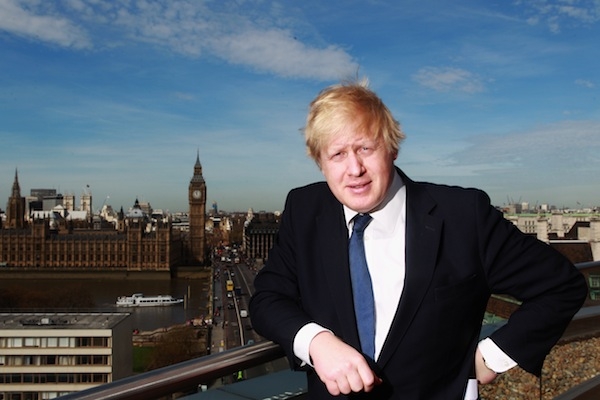Boy, is Boris Johnson persuasive. Not for him the anodyne policy documents that anyone else in regional or central government prefers to produce. His 2020 Vision document, launched today, is brimming with the sort of wit and turn of phrase that he deploys in his speeches and broadcasts. It says a key part of the Olympic road network ‘turned out at the eleventh hour to be about as robust as a freshly dunked digestive biscuit’, says low standards of literacy and numeracy are ‘a melancholy fact’ and a ‘savage reproach’, and offers interesting but useless facts such as ‘the world’s first traffic light arrived at the House of Commons in 1868′. It blew up the following year, injuring the policeman who was operating it’.
But that’s not to say the document isn’t weighty or thoughtful. Here are five key points about the Mayor’s 2020 vision.
1. Boris believes in a ‘trickle-out’ model for London.
The Mayor is conscious that asking for more money for a bustling city at a time of austerity is a big ask even for a man of his rhetorical abilities. He argues that a ‘pound invested in London drives jobs and growth around the country’. He wants politicians to view London as a booming city whose prosperity trickles out to the rest of the country, rather than a leech on public finances that doesn’t really need any more help.
He told the audience today that investing in Crossrail meant jobs in other parts of the country:
‘When you invest in Crossrail you are getting a project that will add £42bn to the UK economy and you are getting cranes from Derbyshire and Newcastle, steel from Darlington, Bolton and Oldham, bridges from Shropshire, survey equipment from Devon and prodigious quantities of lubricant from Bournemouth – and what they are doing in Bournemouth when they aren’t making lube for Crossrail?’
He also insisted that ‘the investment in London often proves to pay for itself’. The key flaw in his document is that it is clearly angling for more money – and lots of it – but isn’t costed beyond the assertion that this investment will offer good returns.
2. Boris wants more money, and he thinks London deserves it, for the reasons listed above.
He warns that it would be ‘fatal – given the competition we face, and the population growth underway – to slacken off now’.
The key areas he wants investment in are transport, which he says is overloaded and in need of upgrades, housing, and tech industries.
3. He is still determined to win the battle on aviation.
The policy document again calls on the government to rule out expansion of Heathrow, saying:
‘We need an urgent solution, and the first step is to rule out a third runway at Heathrow. One of the key arguments of this paper is that we improve the prospects of London by improving quality of life. We are cleaning the air, reducing noise from vehicles, reducing congestion.
‘How insane therefore that some people are still suggesting a third runway at Heathrow – a policy that would erode the quality of life for millions of Londoners.’
And he also takes a few pops at government immigration policy, saying ‘it is absurd that we are losing so many Chinese tourists – who visit Belgium more than the UK – because of the cumbersome visa arrangements in place’.
4. He has a plan to deal with a growing city.
Boris thinks he can address population growth largely by building homes on brownfield sites. He doesn’t have as many options as those in charge of strategic planning decisions elsewhere, but he says the 40,000 new homes that London needs to build every year can be done using 21 ‘brownfield opportunity’ areas in the capital.
He also wants to lift the cap for councils to be able to borrow to fund housebuilding and to release more public land for development. And the Mayor seems far more interested than the Treasury in cracking down on land banking by developers. He wants to introduce a ‘use it or lose it’ planning permission for developers, which will speed up development.
And when it comes to more money from central government, Johnson says it is ‘only fair’ that London should be allocated roughly what the city yields in stamp duty: around £1 billion a year.
5. Boris believes in a positive spirit.
This sounds a bit hippy, but it’s the thinking behind his widely misinterpreted Davos comments about austerity. He wants Londoners to have a hard-headed optimism about improving their city, rather than a tail-between-the-legs mope about cuts. Easier, perhaps, when your city is an economic island floating in a country that still looks very much like it’s in a downturn.
But that optimistic spirit also means not bashing the beating heart of this city: the City. The document says:
‘London is still one of the greatest financial capitals on earth, and there is absolutely no point in bashing or vindictively regulating an industry that generates £63 billion in taxation.’
The Mayor argues that other countries want to ‘knock London off its perch’ and that ‘it makes no sense to “rebalance” the economy by decimating banking. The way to “rebalance” is by encouraging those sectors in which London is also performing well, and where we stand to overtake the rest of the world’.
It’s probably unfair to say that this was a direct pitch from Boris for Downing Street. The Mayor does, after all, have a job to do. And aside from his usual criticisms of aviation policy and immigration restrictions, he was more interested in asking for things from central government than he was in taking a pop at the figures at the top. But by being serious and demanding about that job, he can show that he would make a serious and demanding leader of his party as well.







Comments